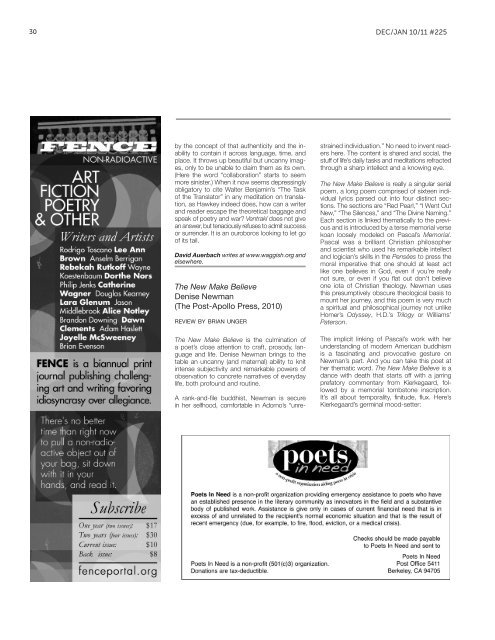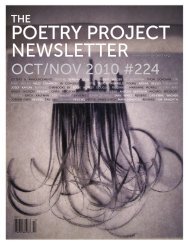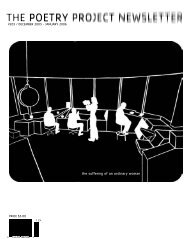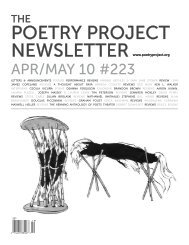Download PDF - The Poetry Project
Download PDF - The Poetry Project
Download PDF - The Poetry Project
You also want an ePaper? Increase the reach of your titles
YUMPU automatically turns print PDFs into web optimized ePapers that Google loves.
30 DEC/JAN 10/11 #225<br />
by the concept of that authenticity and the inability<br />
to contain it across language, time, and<br />
place. It throws up beautiful but uncanny images,<br />
only to be unable to claim them as its own.<br />
(Here the word “collaboration” starts to seem<br />
more sinister.) When it now seems depressingly<br />
obligatory to cite Walter Benjamin’s “<strong>The</strong> Task<br />
of the Translator” in any meditation on translation,<br />
as Hawkey indeed does, how can a writer<br />
and reader escape the theoretical baggage and<br />
speak of poetry and war Ventrakl does not give<br />
an answer, but tenaciously refuses to admit success<br />
or surrender. It is an ouroboros looking to let go<br />
of its tail.<br />
David Auerbach writes at www.waggish.org and<br />
elsewhere.<br />
<strong>The</strong> New Make Believe<br />
Denise Newman<br />
(<strong>The</strong> Post-Apollo Press, 2010)<br />
review by brian unger<br />
<strong>The</strong> New Make Believe is the culmination of<br />
a poet’s close attention to craft, prosody, language<br />
and life. Denise Newman brings to the<br />
table an uncanny (and maternal) ability to knit<br />
intense subjectivity and remarkable powers of<br />
observation to concrete narratives of everyday<br />
life, both profound and routine.<br />
A rank-and-file buddhist, Newman is secure<br />
in her selfhood, comfortable in Adorno’s “unrestrained<br />
individuation.” No need to invent readers<br />
here. <strong>The</strong> content is shared and social, the<br />
stuff of life’s daily tasks and meditations refracted<br />
through a sharp intellect and a knowing eye.<br />
<strong>The</strong> New Make Believe is really a singular serial<br />
poem, a long poem comprised of sixteen individual<br />
lyrics parsed out into four distinct sections.<br />
<strong>The</strong> sections are “Red Pearl,” “I Went Out<br />
New,” “<strong>The</strong> Silences,” and “<strong>The</strong> Divine Naming.”<br />
Each section is linked thematically to the previous<br />
and is introduced by a terse memorial verse<br />
koan loosely modeled on Pascal’s Memorial.<br />
Pascal was a brilliant Christian philosopher<br />
and scientist who used his remarkable intellect<br />
and logician’s skills in the Pensées to press the<br />
moral imperative that one should at least act<br />
like one believes in God, even if you’re really<br />
not sure, or even if you flat out don’t believe<br />
one iota of Christian theology. Newman uses<br />
this presumptively obscure theological basis to<br />
mount her journey, and this poem is very much<br />
a spiritual and philosophical journey not unlike<br />
Homer’s Odyssey, H.D.’s Trilogy or Williams’<br />
Paterson.<br />
<strong>The</strong> implicit linking of Pascal’s work with her<br />
understanding of modern American buddhism<br />
is a fascinating and provocative gesture on<br />
Newman’s part. And you can take this poet at<br />
her thematic word. <strong>The</strong> New Make Believe is a<br />
dance with death that starts off with a jarring<br />
prefatory commentary from Kierkegaard, followed<br />
by a memorial tombstone inscription.<br />
It’s all about temporality, finitude, flux. Here’s<br />
Kierkegaard’s germinal mood-setter:
















